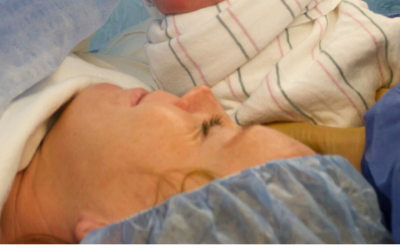
Preeclampsia Foundation grant recipient debuts research to combat preeclampsia
September 23, 2021 – Melbourne, FL –– A research study partially funded by the Preeclampsia Foundation’s Peter J. Pappas research grant has suggested that metformin, a medication currently approved to treat gestational diabetes, may have potential application in cases of pre-term preeclampsia.
 The findings of this study, led by Prof Cathy Cluver, Associate Professor in the Department of Obstetrics and Gynaecology of Stellenbosch University’s Faculty of Medicine and Health Sciences (FMHS) and comprised of South African and Australian researchers, have just been published in the British Medical Journal (BMJ).
The findings of this study, led by Prof Cathy Cluver, Associate Professor in the Department of Obstetrics and Gynaecology of Stellenbosch University’s Faculty of Medicine and Health Sciences (FMHS) and comprised of South African and Australian researchers, have just been published in the British Medical Journal (BMJ).
“Worldwide, preeclampsia claims the lives of 500,000 unborn babies and 70,000 pregnant mothers every year. It is a leading causes of maternal and neonatal deaths in South Africa,” said Dr. Cluver. “Preeclampsia that develops at an early gestation, called pre-term preeclampsia, is a highly dangerous variant of the disease where the risks to baby and mother are particularly high.”
Currently, the only cure for severe preeclampsia starts with delivery of the baby and the placenta, no matter the gestational age. Tragically, preeclampsia is one of the leading known causes of premature birth and infant death worldwide.
Previous efforts to find drugs that are safe to administer during pregnancy that could prolong gestation in preterm preeclampsia, have not succeeded. The idea of metformin as a treatment for preeclampsia came from laboratory studies done by the same research team at Mercy Hospital for Women, in Melbourne, Australia. This study set out to evaluate whether oral metformin could prolong gestation among woman with pre-term preeclampsia at Tygerberg Hospital in Cape Town, South Africa.
 |
| Tygerberg Hospital in Cape Town, South Africa |
The researchers recruited 180 women with preterm preeclampsia between 26 and 32 weeks gestation into the trial with half receiving 3g of oral metformin daily and the other half a placebo in order to compare the potential effects of the medication in prolonging the time to delivery.
“What is really exciting is that the women who took metformin stayed pregnant for 7.6 days longer compared to those who took a placebo,” explained Dr. Cluver. “Furthermore, their babies spent 12 days less in hospital. When we are dealing with this level of prematurity, an extra week in the mother’s womb is likely to be a really important gain that could translate in lifelong health benefits for the baby.”
Advantages of metformin include that it is already widely used to treat gestational diabetes, and it is therefore likely to be safe, especially if administered for a limited duration. A further advantage is that metformin is inexpensive, meaning it could be widely adopted in low-and-middle income countries (LMIC’s) such as South Africa, where the problem is very pronounced. Also, no serious side-effects related to trial medications were observed.
The next step is a larger trial, involving 500 participants, to confirm the findings on a larger scale.
“The Preeclampsia Foundation research grant review team saw the merits of this proposal and the impact it could make to thousands of pregnant women and their babies who face pre-term delivery each year due to preeclampsia,” said Foundation CEO Eleni Tsigas. “We’re thrilled to have been a part of moving this important research forward.”
About the Preeclampsia Foundation
The Preeclampsia Foundation is a U.S.-based 501(c)(3) non-profit organization established in 2000 to improve the outcomes of hypertensive disorders of pregnancy by educating, supporting, and engaging the community, improving healthcare practices, and finding a cure. We envision a world where preeclampsia and related hypertensive disorders of pregnancy no longer threaten the lives of mothers and babies. For more information, visit www.preeclampsia.org.
About the Research Trial
The trial was approved by Stellenbosch University’s Health Research Ethics Committee and the South African Health Products Regulatory Authority.
Funders included: The Preeclampsia Foundation through the Peter Joseph Pappas research grant program, and the South African Medical Research Council. Merck Healthcare kindly provided the trial medications, but played no role in running the trial.
Related Articles

Recent findings in preeclampsia research have shown that preeclampsia likely has at least two variants – an early onset and a late onset variant. Early onset is typically defined as before 34 we...

Preeclampsia is a pregnancy complication marked by new-onset high blood pressure and signs of stress on organs such as the kidneys, liver, and brain. While much attention is often given to preterm dis...

Preeclampsia is a serious problem that can happen during pregnancy. It often affects the brain and can cause headaches, vision problems, strong reflexes, and seizures (called eclampsia). In this study...

Pregnancy offers a unique window into a woman’s future heart and cardiovascular health. Conditions such as hypertensive disorders of pregnancy (HDP) which include gestational hypertension, preec...

Heart disease, also called cardiovascular disease (CVD), is becoming more common in young women across the United States. Hypertensive disorders of pregnancy (HDP) is a group of conditions that includ...
